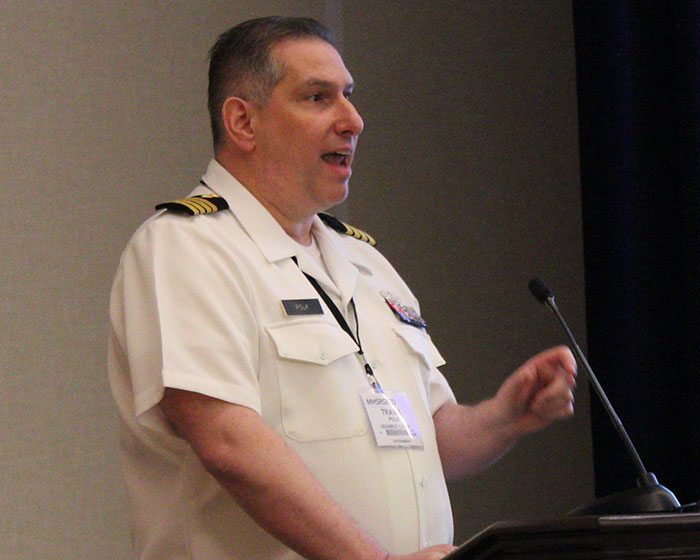Brain Health Takes Center Stage at 2022 MHSRS

During a detailed presentation on the first full day of the 2022 Military Health System Research Symposium in Kissimmee, Florida, Capt. Travis Polk made the case for recalibrating the study of Warfighter brain health – to include traumatic brain injury – across the entirety of the U.S. military. Noting the issue's ripple-like effect across both people and communities, Polk made the case for treating brain health as a global issue – and one requiring a globally-focused solution.
"I think everyone here is familiar with the burden of TBI," said Polk, who serves as the director of the U.S. Army Medical Research and Development Command's Combat Casualty Care Research Program, to the assembled crowd, "but we have to consider, perhaps more broadly, that there are both personal and societal impacts to brain injury – and that this is an issue that has even greater impact in poorer and developing countries."
The bulk of the research designed to tackle that very issue remains rooted in U.S. military efforts, as it has for decades. With more than 282,000 Service Members diagnosed with a first-time TBI since 2007, brain health remains a top concern of the U.S. Department of Defense; an issue that can impact both Soldier readiness and resiliency in varying degrees. The military medical community is placing substantial faith in the recently-released DOD Warfighter Brain Health Initiative Strategy and Action Plan, the tenets of which will seek to guide the synchronization of research efforts to optimize brain health and counter TBI.
"To be an adequate Warfighter, you need to have cognitive skills on par with physical skills," said Katherine Lee, a senior policy analyst for DOD's Health Affairs, who shared the stage alongside Polk during their hour-long presentation –attended by more than 150 people. "We now have a plan," she said, referencing the DOD: WBHI, "and we are now in full execution mode."
In short, the goal of the DOD: WBHI is to maximize overall brain health and function across garrison, training and deployed environments. The plan's five distinct lines of effort cover a wide swath of territory; from cognitive performance to the mitigation of brain threats to the translation of raw data into results. On this last point, Lee was most eager to discuss the plan's bedrock provision: establishing baselines of cognition for every single Service Member via cognitive tests administered every five years.
"If you don't know what cognition is, you can't repair it," said Lee. "This will help us get a clearer picture of brain health and how it is being impacted."
Polk similarly highlighted the release of the DOD: WBHI as a tool to help pull together the various strands of brain health research into a single thread – thereby establishing the kind of overarching discipline required to make strong and positive impacts in the future.
"Those who have TBIs are often also injured elsewhere, they also have polytrauma," said Polk. "This is an area – these types of concomitant injuries – that we don't understand well currently."
Moving forward, both Lee and Polk suggest the keys to unleashing the full potential of the DOD: WBHI may lay in both an increased investment in wearable technology, along with a renewed focus on how, exactly, TBI is treated within the medical profession. The former has seen increased attention within USAMRDC – and the larger DOD as well – over the past few years specifically, while the latter is viewed as an eventual beneficiary of the data collected by such wearable devices. In all, it's a bold and detailed plan – one that seeks to provide healthcare solutions for the U.S. Warfighter and, perhaps, those elsewhere, too.
"We need to understand the scope of the problem better," says Polk. "We're trying to better define TBI strategy for the future."














